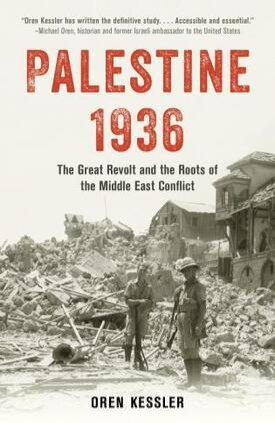 Oren Kessler, author of Palestine 1936: The Great Revolt and Roots of the Middle East Conflict, spoke to a June 2nd Middle East Forum Webinar (video) about the key events during the period 1936 to 1939 that in his view laid the foundation for the establishment of Israel and for the current Arab-Israeli conflict. The following is a summary of Kessler's comments:
Oren Kessler, author of Palestine 1936: The Great Revolt and Roots of the Middle East Conflict, spoke to a June 2nd Middle East Forum Webinar (video) about the key events during the period 1936 to 1939 that in his view laid the foundation for the establishment of Israel and for the current Arab-Israeli conflict. The following is a summary of Kessler's comments:
During the 1930s, Arabs living under the British Mandate of Palestine challenged the increasing Jewish immigration to the territory by launching in the spring of 1936 the Arab Revolt, which "began fairly spontaneously." The Arabs, influenced by Izz ad-Din al-Qassam, a Syrian "jihadi preacher" who arrived in Palestine in the twenties to incite jihad against Jewish and British targets, attacked Jews in a "concerted nationalist uprising." Al-Qassam, who was killed as a wanted man, "becomes the first martyr icon in the Palestinian Arab pantheon." Prophetically, David Ben Gurion, "the undisputed leader of the Jews of Palestine," said at that time that "finally, the Arabs have found someone willing to die for an ideal," and predicted that there would be "dozens, hundreds, or thousands just like him."
Three "legacies" emerged from the revolt: (1) a Jewish state, in the full sense of the word, first appears on the "international agenda"; (2) the Yishuv, "the pre-state community" of Jews of British Mandate Palestine, produces a Jewish army through "British training and facilitation of arms"; and (3) Britain denies the doomed Jews of Europe entry to Palestine during World War II.
 After Britain's first high commissioner for Palestine, Herbert Samuel, appointed Hajj Amin al-Husseini to the position of Grand Mufti of Jerusalem and head of the Supreme Muslim Council, Hajj Amin continued al-Qassam's violence against the Jews. The Mufti took control of the revolt by calling for a widespread Arab general strike. He threatened to continue the strike unless three demands were met: (1) ceasing all Jewish immigration to the country; (2) banning all land sales (many land-owning Arabs at that time were selling lands to Jews at inflated prices); and (3) creating a legislative assembly to reflect the then-Arab majority demographic of Mandatory Palestine. Hajj Amin's aim was to prevent Jews from becoming a majority in the Mandate through the Jewish population's rapid growth in Palestine since the early 1930s. As antisemitism escalated in European countries, Jewish immigration to Mandatory Palestine during the first half of the 1930s doubled. As a result, Jews accounted for thirty percent of the population when the revolt began.
After Britain's first high commissioner for Palestine, Herbert Samuel, appointed Hajj Amin al-Husseini to the position of Grand Mufti of Jerusalem and head of the Supreme Muslim Council, Hajj Amin continued al-Qassam's violence against the Jews. The Mufti took control of the revolt by calling for a widespread Arab general strike. He threatened to continue the strike unless three demands were met: (1) ceasing all Jewish immigration to the country; (2) banning all land sales (many land-owning Arabs at that time were selling lands to Jews at inflated prices); and (3) creating a legislative assembly to reflect the then-Arab majority demographic of Mandatory Palestine. Hajj Amin's aim was to prevent Jews from becoming a majority in the Mandate through the Jewish population's rapid growth in Palestine since the early 1930s. As antisemitism escalated in European countries, Jewish immigration to Mandatory Palestine during the first half of the 1930s doubled. As a result, Jews accounted for thirty percent of the population when the revolt began.
The Arab strike lasted six months, pausing only after the British government dispatched the Peel Commission to investigate grievances. The Commission's report produced the first of the three legacies — "the first two-state solution" to appear on the international agenda. Recommending partition, the Peel Commission became the "ideological template" of "partition plans" through the present day. While Ben-Gurion was privately "euphoric" about the recommendation, the Mufti rejected it outright as a "humiliation."
The Mufti, "pulling the strings of this revolt," raised the incitement level, which culminated in the assassination in 1937 of Lewis Andrews, a British proponent of the partition plan and acting governor of the Galilee. Andrews was also the highest-ranking British official to be assassinated in Mandatory Palestine. Fearing arrest by the British, Hajj Amin fled the country, and as the Arab revolt escalated in 1938, World War II was on the verge of erupting.
The British, short of manpower, trained and armed 20,000 Jews in the framework of the Notrim, "the Jewish Supernumerary Police," to counter the Arabs, thereby creating the "second major legacy" of the revolt. The establishment of this force enabled the Haganah, "the mainstream Jewish armed force," to evolve from a "glorified group of night watchmen" into the "seed of the Jewish army" facilitated by the British Empire. The Jewish army's emergence coincided with great "economic, industrial, agricultural [and] demographic gains" for the Jews. Settlements sprang up, and the Jews "formed the kernel of their state-to-be in 1939."
During that time, Britain received a temporary reprieve from the "Munich crisis" after Neville Chamberlain's government appeased Hitler by acceding to his demand that Germany take control of Czechoslovakia's Sudetenland. The respite enabled Britain to send two divisions of soldiers to quell the Arab uprising in Palestine in a "brutal" counterinsurgency. Hampered by Arab infighting that erupted in Hajj Amin's absence, the revolt ended.
Despite its muscular approach to ending the revolt, Britain pursued a policy of appeasement elsewhere in the world. Thus, concerned that Muslims in India would not side with Britain, the government convened the St. James Conference in London in 1939, which opted to placate Arab and Muslim opinion. The conference produced the White Paper, which limited the number of Jews permitted to enter Palestine, declaring "that over the next five years, only 75,000 Jews in total could come to this land. And then no more Jews could immigrate without Arab consent." The Mufti, exiled in Beirut, rejected the White Paper "for not going far enough."
To the Jews, the White Paper was a betrayal of Britain's 1917 Balfour Declaration supporting a Jewish homeland in Palestine, a rejection of the Peel Partition plan, and a death trap for their co-religionists in Europe. Yet, "despite the tremendous toll in blood that the [Arab] revolt inflicted on the Jews. . . . As the revolt is brought to an end and the World War begins, the Jews have that kernel and springboard of a state. And on the Arab side, it's really the mirror image."
Instead of crushing Zionism, the Arabs, with their "leadership in exile," thousands killed, thousands fleeing, and a "huge amount of bad blood within the Arab community," were themselves crushed. Kessler argues that by 1948, the "showdown" between the Jews and Arabs was won by one side and lost by the other "really nearly ten years in advance."
Marilyn Stern is communications coordinator at the Middle East Forum.
